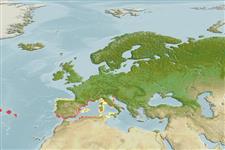>
Gobiesociformes (Clingfishes) >
Gobiesocidae (Clingfishes and singleslits) > Lepadogastrinae
Etymology: Apletodon: Greek, aplatos, apletos = terrible + Greek, odous = teeth (Ref. 45335).
Environment: milieu / climate zone / depth range / distribution range
Ecología
marino demersal; rango de profundidad 2 - 19 m (Ref. 28715). Subtropical; 45°N - 36°N, 32°W - 14°E
Distribución
Países | Áreas FAO | Ecosistemas | Ocurrencias, apariciones | Point map | Introducciones | Faunafri
Mediterranean Sea: Rovinj and Premantura (Istria, northern Adriatic Sea), around Elba (Italy), Ibiza (Baleares), Banyuls-sur-Mer (southern France). Northeast Atlantic: Azores.
Tamaño / Peso / Age
Maturity: Lm ? range ? - ? cm
Max length : 2.7 cm SL macho / no sexado; (Ref. 28715)
Juveniles about 1-2 cm SL are often observed in association with sea urchins and in beds of Posidonia oceanica. Adults found hidden under stones covered with red calcareous algae and empty shells of mussels near Posidonia and Cymodocea nodosa beds. Among Posidonia, the species is often sympatric with Opeatogenys gracilis (Ref. 28715).
Life cycle and mating behavior
Maturities | Reproducción | Spawnings | Egg(s) | Fecundities | Larva
Hofrichter, R. and R.A. Patzner, 1997. A new species of Apletodon from the Mediterranean Sea and the eastern Atlantic with notes on the differentiation between Apletodon and Diplecogaster species (Pisces: Teleostei: Gobiesociformes: Gobiesocidae). Senckenbergiana biol. 77(1):15-22. (Ref. 28715)
IUCN Red List Status (Ref. 130435)
Threat to humans
Harmless
Human uses
Herramientas
Special reports
Download XML
Fuentes de Internet
Estimates based on models
Preferred temperature (Ref.
123201): 17.6 - 19.2, mean 18.7 °C (based on 109 cells).
Phylogenetic diversity index (Ref.
82804): PD
50 = 0.5156 [Uniqueness, from 0.5 = low to 2.0 = high].
Bayesian length-weight: a=0.00513 (0.00202 - 0.01305), b=3.11 (2.89 - 3.33), in cm total length, based on LWR estimates for this (Sub)family-body shape (Ref.
93245).
Nivel trófico (Ref.
69278): 3.1 ±0.5 se; based on size and trophs of closest relatives
Resiliencia (Ref.
120179): Alto, población duplicada en un tiempo mínimo inferior a 15 meses (Preliminary K or Fecundity.).
Fishing Vulnerability (Ref.
59153): Low vulnerability (10 of 100).
